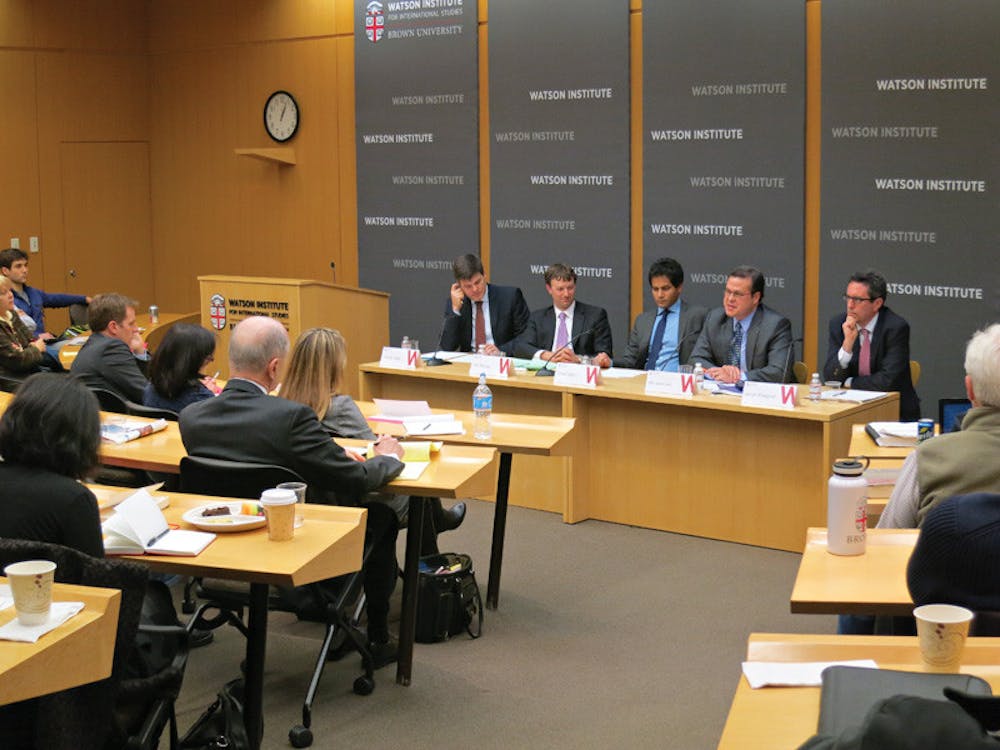The real-world impact and transparency of federal surveillance programs took center stage at a pair of panels presented Wednesday to a full Joukowsky Forum auditorium.
The conference, titled “Big Transparency for the NSA: Perspectives on Spying and Privacy,” was hosted by the Watson Institute for International Studies and was moderated by Timothy Edgar, former director of privacy and civil liberties for the White House’s national security staff and visiting scholar at the Watson Institute.
The first session, titled “Privacy and Transparency, Inside and Out,” featured four panelists who presented their perspectives on the transparency of federal surveillance programs.
Jameel Jaffer, deputy legal director of the American Civil Liberties Union, questioned the National Security Agency’s “scope of collection” of Americans’ and foreigners’ personal data and the NSA’s “scope of authority.”
Alexander Joel, civil liberties protection officer at the Office of the Director of National Intelligence, said the federal government is working to increase the transparency of data collection but added that intelligence agencies are “designed and built” to operate in secrecy, which naturally limits their transparency.
The “most troubling” issue about data collection is not that the federal government is “withholding” information but that officials are “misleading us” about the nature of data collection, Jaffer said. Intelligence agencies’ high level of secrecy means details of surveillance programs are not divulged, he added.
“These programs do not target anyone. They target everyone,” Jaffer said, responding to an audience member’s question about whether visiting intelligence agency websites increases a web user’s “vulnerability” to surveillance.
Jaffer cited the former communist state of East Germany as an example of how “pervasive surveillance shut down activities” in daily life.
Steven Aftergood, senior research analyst at the Federation of American Scientists and publisher of the intelligence blog Secrecy News, said federal agencies have “conducted unprecedented declassification” of older documents in the past five years.
But Aftergood said intelligence agencies have declassified older documents to build credibility with the public, adding that this declassification process has not applied to newer documents.
John DeLong, the NSA’s director of compliance, said surveillance transparency is crucial in an “open democracy.” DeLong focused his discussion on the Patriot Act’s Section 215, which authorizes the federal government to collect data on telephone communication between Americans and foreign terrorist organizations, and the Foreign Intelligence Surveillance Act’s Amendments Act Section 702, which allows officials to access the content of phone calls of foreigners not in the United States.
Section 215 aims “to see whether a terrorist organization is on telephone communication with somebody inside the (United States),” Joel said, adding that the program is “narrow” and “limited,” with fewer than 300 uses of the database last year.
Jaffer challenged Joel’s claim, saying there is “no regulation” on the use of the database.
DeLong said the program’s purpose is to ensure the NSA can provide the Federal Bureau of Investigation with accurate phone numbers for suspected terrorists.
The second panel, titled “Transparency — What Good Is It?,” consisted of Charles Savage, a Washington correspondent for the New York Times, Siobhan Gorman, a terrorism and intelligence reporter for the Wall Street Journal, and Ellen Nakashima, a national security reporter for the Washington Post.
The panelists described their experiences working on intelligence stories, including the intelligence files leaked by former NSA contractor Edward Snowden.
Savage described how his first attempts to pursue the Snowden story failed, but the federal government’s denial of his initial request to access classified data led him to further investigate the story.
The story of intelligence agencies’ widespread use of personal data raises interesting questions, Savage said. The Snowden story has prompted discussions of whether concerns about the Patriot Act stem from the fact that the federal government has collected so much personal data or from the sole existence of such metadata, he added.
“There’s a great debate that has been launched about life in the 21st century and going forward, when we’re all leaving these metadata trails … that I was unable, and failed, to get my hands around until Edward Snowden came along,” Savage said.
Gorman said reporters pursuing news about intelligence issues face a challenge from the inherent secrecy of potential sources. “Usually we’re at a disadvantage, so to speak, in that we can’t actually read the material,” Gorman said.
The release of surveillance information in the Snowden case was important because “the documents then forced the government to actually try to start explaining some of these things,” Gorman said. “It’s really sort of shaken the trees in a way that I don’t think we would have seen otherwise.”
Nakashima highlighted the need for balance between government secrecy and a well-informed public.
“There’s a predilection from the government’s side to keep these programs a secret, because in their view, if you discuss them publicly, you might tip off targets,” Nakashima said. But she added that agencies’ hesitation to release information is a “tactical concern,” voicing her support for securing “public consensus” for “sweeping collection programs.”
Some audience members said they enjoyed the second panel’s focus on real-world impacts of surveillance programs, but some who attended the first panel expressed mixed feelings.
“The issues were all spoken to and addressed in a very high and sophisticated manner,” said Merle Krueger, a resident of Lincoln, R.I., who attended the second panel. “It’s an exercise to me in public education, that particularly with this issue more than any other that I can think of, is critically necessary.”
Samuel Brebner ’16 said he saw the forum as “putting a face” to “technical and international” dimensions of surveillance policies that he studied in CSCI 0180: “Cybersecurity and International Relations.”
The first panel’s presenters “didn’t go into the heart of the matter,” said David Katzevich ’16, describing the session as “underwhelming.”
Presenters on the first panel did not discuss the issue with enough nuance, said Jahmour Givans ’16, adding that panelists stuck to “slogans” in their speeches.

ADVERTISEMENT




